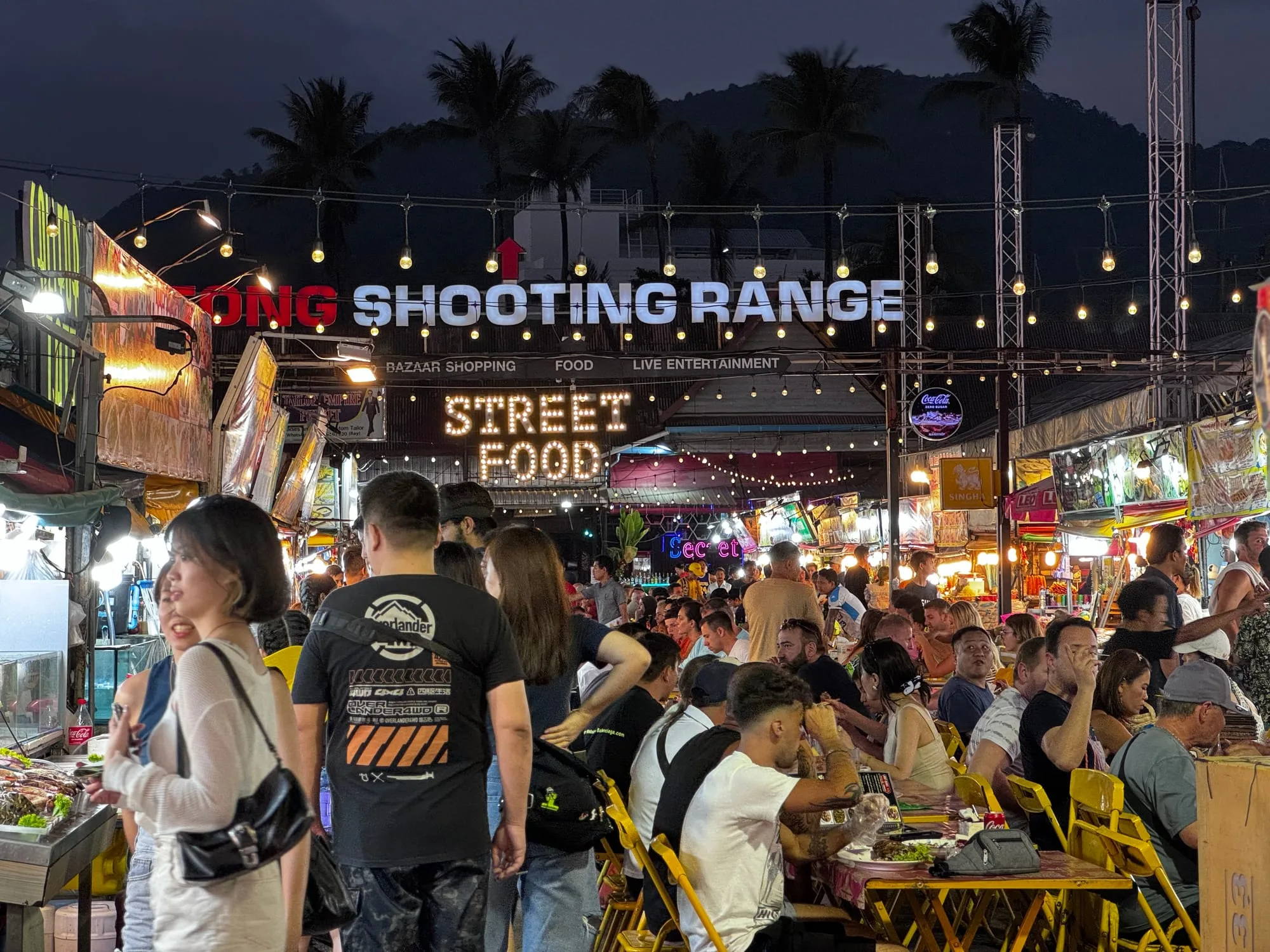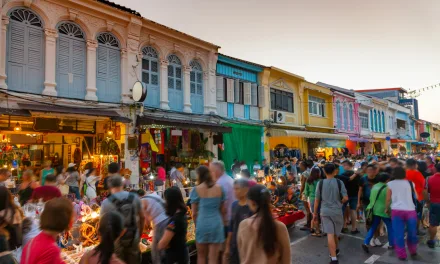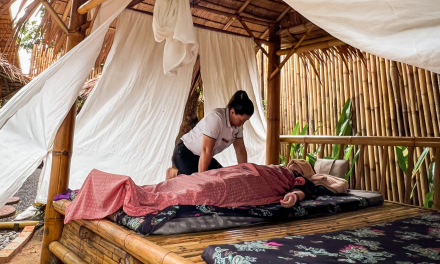Ever feel like you’re paying “tourist prices” everywhere you go?
Phuket’s beautiful, but let’s face it – getting overcharged in Phuket is a thing. From tuk-tuks to food stalls, it can feel like there’s a target on your back.
Here’s how to dodge the rip-offs and keep more baht in your pocket.
1. Spot the Overcharging Scenarios Before They Hit You
If it feels expensive, it probably is. Here’s where overcharging sneaks in the most:
Tuk-Tuks and Taxis
- Tuk-tuk drivers love quoting sky-high prices, especially near Patong Beach or Bangla Road.
- No meters in taxis means the fare’s whatever they decide.
- Grab is a lifesaver here – it shows you upfront pricing.
Pro Tip: Always ask locals what a fair rate should be before hopping into a ride.

Market Haggling Gone Wrong
Markets like Chillva Market or Phuket Weekend Market are hotspots for haggling.But if you don’t know the base price, you’re toast.
Here’s what to do:
- Start by offering 50% of what they ask for.
- Walk away if it feels wrong – they often call you back with a better deal.
Overpriced Food by the Beach
Beachfront dining in Kata Beach or Chalong Bay? Expect to pay more.Some menus even sneak in a “tourist tax.”
Look for spots with locals eating – they know the real deals.
2. Master the Art of Negotiation in Phuket
Negotiating here isn’t rude; it’s expected.
But there’s a right way to do it:
- Smile – Thais value friendliness, even when haggling.
- Speak some Thai – A simple “tao-rai?” (how much?) earns respect.
- Cash talks – If you flash cash, they’re more likely to drop the price.
Know Where You Can’t Negotiate
Some places have fixed prices – like chain stores or 7-Eleven.But markets, tuk-tuks, and independent tours? Fair game.
3. Use Tools and Services to Save Money
You don’t have to go it alone. Some apps and services make it easy to avoid overpaying.

Transport Hacks
- Download Grab Thailand for rides – it’s cheaper than taxis.
- Local buses (songthaews) cost pennies compared to tuk-tuks.
- For day trips, book with a reputable tour operator (look for high reviews).
Scooter Rentals
- 200-300 baht per day is fair.
- Don’t get tricked into paying for “insurance” on top of that.
- Check out the Skoot app for now fluff scooter rentals.
SIM Cards Without the Rip-Off
At the airport, some vendors mark up SIM cards.Instead:
- Look for official stores like DTAC, AIS, or TrueMove.
- Compare data plans – you shouldn’t pay more than 300-400 baht for a week’s worth.
Activities and Attractions
Big tourist spots like the Big Buddha or Phi Phi Islands can have inflated entrance fees.Always book tickets online for discounts, or check if it’s free for locals and expats (sometimes you can match their rate!).
- Day trips to Phi Phi Islands start around 1,200-1,500 baht.
- Anything over 2,000 baht? Compare on platforms like Klook first.
4. Avoid Restaurant Markups
Eating in Phuket can either drain your wallet or be a steal.
Here’s how to avoid overpaying:
- Avoid places with no-price on their menus. They often have ‘a surprise’ ending for tourists.
- Eat where locals eat. Small stalls or restaurants with Thai families = good food and fair prices.
- Street food can be your best friend. Get a bowl of noodles or a plate of pad Thai for under 50 baht.
Tip for Patong and Bangla Road
If a place has no menu and the waiter “suggests” dishes, ask for prices upfront. Surprise bills are common in touristy areas.
5. Know When You’re Being Played
Some scams are subtle. Others? Not so much.
Fake Discounts
“Special price for you, my friend!” means the opposite.If someone offers you a deal too quickly, you’re likely paying extra.
Tuk-Tuk Mafia Zones
Certain areas – like Patong Beach – are dominated by tuk-tuk groups.They won’t budge much on prices. Instead, walk a few blocks and grab a ride outside the tourist zone.
6. Avoid Tourist Trap Tours
Not all tours are created equal.
Red Flags
- They promise “exclusive” access.
- They rush you to sign up without letting you compare prices.
- Packages that don’t include entrance fees – they’ll upcharge you on-site.
Pro Tip: Stick to well-reviewed companies on sites like Klook or GetYourGuide.
7. Keep a Local Mindset
If you think like a tourist, you’ll pay like one.Here’s how to blend in and pay local prices:
- Dress down – Flashy clothes scream “tourist money.”
- Learn the currency – Know what baht coins and notes look like to avoid getting short-changed.
- Stay calm – If you get overcharged, negotiate politely. Aggression won’t work in Thailand.
8. Trust Local Reviews, Not Tourist Hype
Not all places hyped online are worth your money.
Here’s how to filter through the noise:
- Google Reviews are gold. Look for places with a mix of locals and tourists leaving feedback.
- Go with businesses that have a solid reputation, a high number of positive reviews, and are considered the go-to choice in their industry.
- Check forums like TripAdvisor or Reddit Thailand Travel. Locals and expats spill the tea there.
For example, instead of hitting the first massage shop on Bangla Road, look for reviews on a place like Ton Mai Spa, which is transparent about pricing.
9. Stay Smart with Water and Drinks
Thirsty? Don’t overpay just because you’re parched.
- Water bottles at tourist hotspots like Kata Beach can cost 30-40 baht.
- Buy from a 7-Eleven instead, where it’s 7-10 baht.
- Bars on Bangla Road? Look for happy hour deals – some places offer 2-for-1 cocktails.
Pro Tip: Avoid minibars in hotel rooms. That “convenient” bottle of water might cost you 10x the supermarket price.
10. Avoid the Classic Currency Conversion Trap
Some shops or hotels will “helpfully” convert your bill into your home currency.This is called Dynamic Currency Conversion, and it’s always a rip-off.
Stick to paying in baht.Use your card or withdraw cash from an ATM with a decent rate.Look out for ATMs from reputable banks like Bangkok Bank or Kasikornbank.
11. Recognise Overpriced Souvenirs
Not all souvenirs are a good deal.
Here’s how to spot tourist pricing:
- Big Buddha souvenirs at the attraction? Double the price of what you’d pay in Phuket Town.
- Handcrafted items at local shops are often cheaper than stalls near beaches.
- Bulk-buy snacks at supermarkets like Big C or Tesco Lotus, not market stalls.
For a realistic souvenir price, a small magnet shouldn’t cost more than 50 baht, and a cotton t-shirt should be under 250 baht.
12. Go Local for the Best Exchange Rates
Currency exchanges in Phuket are tricky.
Here’s how to get a good deal:
- Avoid exchange booths at Phuket International Airport – their rates are awful.
- Look for trusted chains like The One Exchange or Siam Exchange.
- Always double-check the displayed rates before handing over cash.
13. Know When to Walk Away
Sometimes the best move is leaving.
Let’s say a tuk-tuk driver quotes 500 baht for a short ride.Instead of arguing, step back and look for alternatives:
- Hop on a songthaew (local bus) for 30 baht.
- Use Grab or Bolt to get a better rate.
If a market vendor won’t budge, walk to another stall.There’s always someone willing to deal fairly.
Every baht saved adds up, and knowing how to avoid being overcharged in Phuket turns your trip from stressful to seamless.
Stay sharp, stay savvy, and enjoy your trip without breaking the bank.





